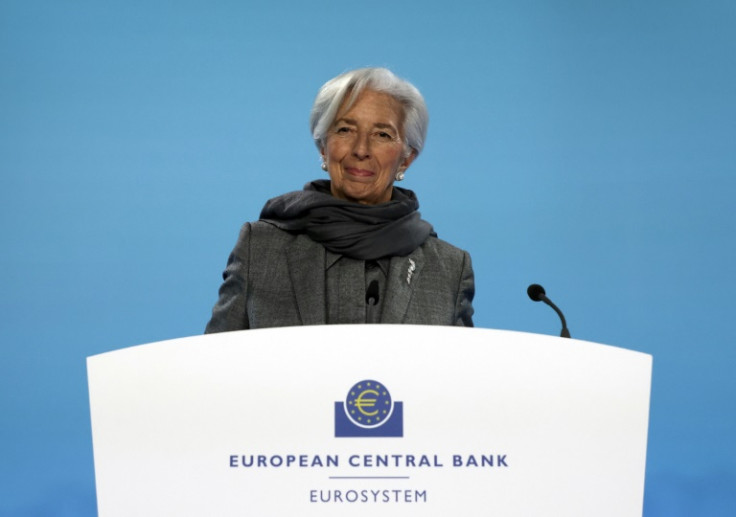ECB To Signal No Rush To Cut Interest Rates

European Central Bank policymakers are expected to keep interest rates steady on Thursday and signal they are in no hurry to start slashing borrowing costs despite progress against inflation.
The Frankfurt institute is tipped to pause for the third meeting in a row following a historic run of hikes to tame runaway prices, leaving the benchmark deposit rate at four percent.
ECB president Christine Lagarde said last week rates had likely reached their peak but that it was too soon to "shout victory" on inflation, citing economic uncertainties and the possible impact of rising wages on price pressures.
She also pushed back against market bets of rate cuts as early as April, joining other ECB officials in signalling that borrowing costs would "likely" only start coming down in the summer -- and if the latest economic data supported such a move.
The ECB is "in no rush yet" to change course and governors may not even discuss cuts at this week's meeting, Deutsche Bank economists wrote.
"We expect Thursday's ECB press conference to again highlight the exceptionally low possibility of a rate cut before the summer," agreed Unicredit in an analyst note.
In the United States, where investors have been penciling in a first rate cut in March, Federal Reserve officials have also been tempering expectations, indicating more work remains to be done to return inflation safely to the long-term target of two percent.
Atlanta Fed president Raphael Bostic last week said he saw rate reductions coming in the third quarter, or sooner if there was "convincing" evidence of inflation slowing more than expected.
After falling steadily for months, eurozone inflation reaccelerated to 2.9 percent in December.
The increase was widely expected and mainly due to the comparison effect with a year earlier, when governments provided exceptional support to help households after Russia's invasion of Ukraine pushed energy prices higher.
Overall, Lagarde has said the battle against inflation was "on the right path" with the ECB forecasting a return to its two-percent target in 2025.
But in an interview with Bloomberg television at Davos last week, she also expressed caution.
She said the ECB was closely monitoring several risk factors that could drive inflation up again, including wage negotiations as workers seek pay rises to compensate for higher living costs.
It will take several months to get a clearer picture of euro area wage agreements, she said, bolstering the case for a rate cut at the June meeting at the earliest.
The ECB was also keeping a close eye on energy costs and supply chains, Lagarde said, in a nod to tensions in the Middle East and shipping delays in the Red Sea that could impact prices and weigh on economic growth.
The 20-nation eurozone economy, feeling the pain from higher interest rates and weaker exports, shrank by 0.1 percent in the third quarter of 2023.
Although the ECB has forecast growth in the fourth quarter, analysts are more pessimistic.
The latest "surveys and official data suggest that the economy is more likely to have contracted at the end of last year and there is little sign that things are going to improve" in the first quarter of 2024, said Jack-Allen Reynolds from Capital Economics.
© Copyright AFP 2025. All rights reserved.





















